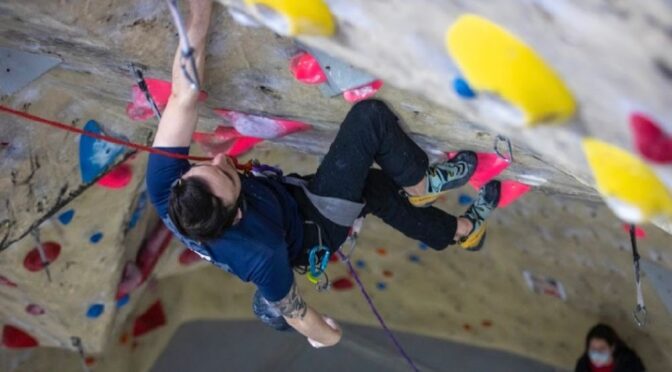
For over a year, LightHouse Community Services Coordinator, Andrew Martinez, has been organizing paraclimbing outings for the LightHouse community. Paraclimbing is adaptive rock-climbing for individuals with disabilities. Since LightHouse began joining ParaCliffHangers (a paraclimbing organization that helps set up accessible climbing routes at rock climbing gyms) a love for the sport has sparked within the blind and visually impaired Bay Area community.
“About a year and a half ago, I was playing goalball with BORP and someone mentioned there was an adaptive climbing event coming up,” explains Andrew Martinez. “I’ve always wanted to climb but didn’t know if it was an accessible sport that I could do. When they told me there was an adaptive group that meets up and climbs together, I thought it would be a great opportunity to finally try it out.”
Not long after his experience climbing with ParaCliffHangers at gyms in Oakland and Berkeley, Andrew began coordinating climbs once a month on Sundays for LightHouse students. Among the many students who have attended these outings, two students in particular have found a true admiration and dedication to the sport.

“I started climbing regularly a little over a year ago,” says longtime LightHouse student and Assistant Enchanted Hills Camp Director, Ellie Kneer. Taking quickly to the sport, Ellie followed her newfound passion and began a leadership role within the climbing community. “I became a Chapter Lead with Pacific Pipe Climbing—I co-lead with other disabled climbers and focus on the chapter’s administrative work and signing up new members,” Elie explains. “For me, it isn’t about how far or how high you can climb, it’s really about the community aspect of the sport.”
For blind and visually impaired climbers, the sport is split up into three categories—B1, B2, and B3. The different categories are based on the climbers’ visual acuity and functional vision, B1 being totally blind or very little functional vision, and B3 being the highest level of functional vision for a legally blind/low vision climber. Visually impaired climbers are paired with a caller, a sighted person who communicates with the climber from the ground, calling out possible pegs or holes within reach to assist the climber in safely navigating their way to the top.

“I think of climbing as a mental challenge as much as a physical one,” says LightHouse student and avid climber, Ahmad Rahimi. Ahmad first tried adaptive climbing as a child but has only started regularly climbing and training in July of 2023. “I enjoy pushing myself mentally and emotionally during a climb, testing my strength and determination. Every step is an achievement, no matter how high you get,” says Ahmad.
On Friday, March 8, Andrew, Ellie, and Ahmad headed to Maryland to attend the United States Climbing National Competition. The stakes were high, as the top two climbers in each paraclimbing category will make the United States Paralympic Team. After an exciting but gulling two days of competitive, challenging climbs, team LightHouse came out incredibly successful!
Andrew Martinez placed 2nd overall in his category (B3) and took home a silver metal! And, as the highest-ranking American climber in his category, Andrew has climbed his way onto the United States Paraclimbing Paralympic Team!
“I had an incredible time competing at Nationals,” says Andrew. “I had to work through some nerves climbing in front of so many people but overall enjoyed the whole experience. I can’t wait to compete on the world stage and represent the US!”
Taking home the gold for his category (B2) and also earning his spot of Team USA is 18-year-old LightHouse student Ahmad Rahimi!
“Making it on to Teem USA was a dream that I hoped would come true,” Ahmad says. “I knew that I would like to make it on to the team no matter how much work it took. Nonetheless, it still feels very surreal. I feel very happy and accomplished for the time being, but I hope to take climbing to higher levels.”
Placing 5th in her category (B2) Ellie Kneer is proud to be a Team USA alternate and excitedly awaits the next big competition.
“I was up against some beasts!” Ellie says fondly and admirably about her fellow climbers and competitors. “I love everyone who I competed against; they make me a better climber!”
So, what’s next for these LightHouse paraclimbers? The next competition will be in May in Salt Lake City then to France this summer for the International Federation of Sport Climbing (IFSC) World Cup. Good luck, Andrew, Ahmad, and Ellie! Keep climbing and reaching for the stars!




